The 8 Best Essential Oils for Anxiety & Stress Relief
In a hurry? Click here to read the Article Summary...
Did you know that the most common mental health issues in the U.S. are anxiety disorders? According to the National Institute of Mental Health, anxiety affects 18.1% of the U.S. population, with women being 60% more likely than men to experience an anxiety disorder over their lifetime.
And these are just the diagnosed cases. We can’t know the true level of people living with anxiety who haven’t sought professional help. Those simply holding on by their fingernails, getting by. Then, of course, there are those who suffer periodic anxiety due to specific events, or certain stressors in life. Trips to the dentist, being in labor, workloads, surgery, family problems… anxiety is rife in today’s modern world.
Whatever the case or reason, the fact is anxiety costs the U.S. over $42 billion a year! That’s from patients seeking treatment through traditional health care, mainly the cost of repeated visits. This would seem to indicate that whatever the docs are doing and/or prescribing… isn’t working so well!
Here’s the next question…
Did you also know that for centuries, essential oils have been used for supporting health… including for helping reduce anxiety?
If you look at the growing library of research on these powerful plant oils (that are some 40-50% more powerful as extracts than the plant themselves), it’s no wonder. What a gift to have bona fide science finally backing up what traditional practices have known for thousands of years. Literally!
If you’re looking for an essential oil for anxiety, here are 8 of the best options according to science…
#1. Lavender Essential Oil
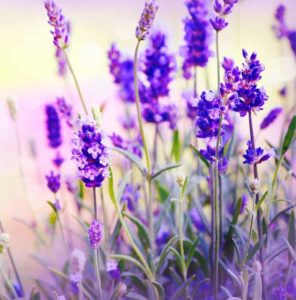 Historically oil of lavender has been used for everything from perfume to healing, from embalming to insect repellent.
Historically oil of lavender has been used for everything from perfume to healing, from embalming to insect repellent.
Among its benefits, lavender has been shown to support pain relief. Add to this list burn healing, allergy support, and being anti-fungal. She’s the queen of essential oils, for sure!
When it comes to oils for anxiety, lavender is the best essential oil for anxiety across the board. In fact, it’s even been put into capsule form and sold as a natural anti-anxiety supplement. It’s non-sedative while being non-addictive.
One study published in the Japanese Journal of Pharmacology that elicited anxiety responses in mice (alarm periods), went so far as to say, “lavender oil increased the response rate during the alarm period in a dose-dependent manner in the same manner as diazepam.” [Note: Diazepam was first marketed as valium and is a drug commonly used to treat anxiety disorders.]
A 2013 paper published in the journal Evidence-Based Complementary and Alternative Medicine stated that studies on both animals and humans provides growing evidence that “lavender oil may be an effective medicament in treatment of several neurological disorders.”
It’s not just for anxiety disorders, though. Lavender essential oil has been studied for use in operations and dental work, showing great effect at lowering stress and anxiety during these often fraught situations.
When using lavender to help with anxiety, don’t be fooled by imitations: there is only one “true” lavender that has the most potent effects: Lavandula angustifolia.
You can use lavender essential oil in a variety of ways to address anxiety: as aromatherapy via inhalation, ingestion (see cautions further below), as well as applying to the skin. In the case of skin applications, you can apply it directly or use a carrier oil (organic, cold-pressed coconut, avocado, or olive oil are all good options) and it will absorb and be at its peak of efficacy after about 20 minutes.
#2 & 3. Lemon and Orange Oil
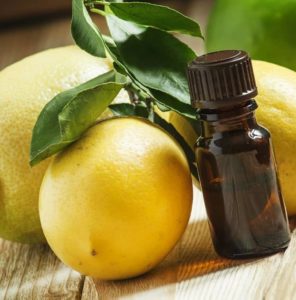 When it comes to the wonders of both lemon and orange essential oils, it’s all about the phytochemical (plant chemical) limonene. There is extensive research on this potent plant compound, including over 200 studies just examining its anti-cancer benefits.
When it comes to the wonders of both lemon and orange essential oils, it’s all about the phytochemical (plant chemical) limonene. There is extensive research on this potent plant compound, including over 200 studies just examining its anti-cancer benefits.
The levels of limonene in citrus plants will vary depending on the trees themselves, but in general lemons contain 59-73% limonene, and orange oil 85-96%.
In a 2006 study, lemon oil was found to possess “anxiolytic [anti-anxiety], antidepressant-like effects.” In one study between the essential oil of lemon and other oils, researchers stated that “lemon oil had the strongest anti-stress effect.”
Orange essential oil has been studied in a variety of anxiety-causing circumstances, most notably dentistry, surgery, and women in labor. All research points to the positive effect orange oil had on the anxiety levels of patients.
Both lemon oil and orange oil can be used via inhalation and skin application. You can also add a drop or two to your water, for added flavor and health benefits.
#4. Rose Essential Oil
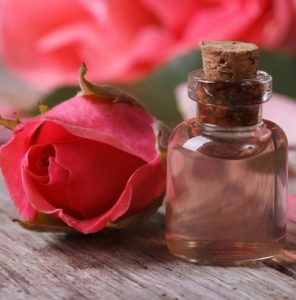 Rose oil has been used historically for everything from cooking to perfume. Though it has always been highly revered in traditional healing practices, not everyone realizes the health benefits this fragrant oil hides as well.
Rose oil has been used historically for everything from cooking to perfume. Though it has always been highly revered in traditional healing practices, not everyone realizes the health benefits this fragrant oil hides as well.
The key components of rose oil are the phytochemicals citronellol and geraniol. Depending on the plants, soil, and harvesting of the flowers, rose oil contains 34-44% and 12-28% of these powerful chemicals, respectively.
The reported uses/benefits of rose essential oil include (in alphabetical order):
- acting as an antidepressant
- antiphlogistic (preventing/relieving inflammation)
- antiseptic (preventing the growth of disease-causing microorganisms)
- antispasmodic (relieving spasms)
- antiviral
- aphrodisiac
- astringent
- bactericidal
- cholagogue (promoting beneficial discharge of bile)
- cicatrisant (forming healing scar tissue)
- depurative (purifying/detoxifying)
- emmenagogue (stimulating menstrual flow)
- haemostatic (stopping bleeding)
- hepatic (helping keep the liver strong)
- laxative
- nervine (calming the nerves)
- stomachic (promoting appetite/assisting digestion)
- uterine (regulating menstruation)
Several studies have shown rose oil to posses the power to “significantly lower” anxiety. This includes a 2009 study where blood pressure, breathing rate, pulse rate (which is dependent on heart rate), and oxygen saturation were positively affected by transdermal absorption of rose oil. It’s also been used as an essential oil for helping with depression.
#5. Geranium Essential Oil
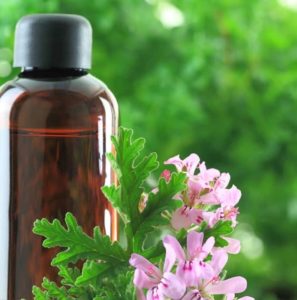 Yet another powerful flower! Although geranium oil is actually distilled from the leaves and stems, as opposed to the flower petals as is rose oil.
Yet another powerful flower! Although geranium oil is actually distilled from the leaves and stems, as opposed to the flower petals as is rose oil.
Because geranium oil is significantly less expensive to produce, it is often used in place of rose oil. However, the essence of geranium should not be dismissed. It contains its own depths as a natural healing aid, with some 65 phytochemicals, as well as being rich in antioxidants. Little wonder then that geranium oil has been long used for a wide variety of health benefits!
Studies have also shown geranium oil to help relieve anxiety, and bring higher levels of well-being. A 2015 study reported, “The mean anxiety score decreased significantly after inhalation of the aroma of geranium essential oil. There was also a significant decrease in diastolic blood pressure.”
You can use geranium oil in a variety of ways. Try rubbing it on your skin (either directly or with a good carrier oil such as jojoba or fractionated coconut oil) or using a cold diffuser. Even placing some drops on your hands and rubbing them together as you inhale has positive effects.
The FDA has deemed this oil safe for consumption, so if you have a food or supplement grade oil you could try adding a couple drops to a drink, sweetening (if desired) with a healthier sweetener such as organic honey or green stevia.
#6 & 7. Peppermint & Eucalyptus Essential Oils
These are two essential oils that, while well known, have not been commonly connected to anxiety relief. First, let’s look at peppermint essential oil…
It may surprise you to learn that this “spicy” oil has been found to have anxiolytic (anxiety reducing) benefits, as well. It’s true, this oil is more commonly known for its other qualities, including being antiseptic/antibacterial, antiviral, offering pain relief, and acting as an amazing digestive aid and for calming a nervous stomach. However, researchers from the University of Maryland Medical Center found that peppermint oil has “a calming, soothing effect on anxiety and depression.”
Several other studies have been done and continue on the benefits of using this plant powerhouse for anxiety.
Another essential oil that’s not often been connected to anxiety relief is eucalyptus. A 2014 study reported that “1,8-Cineole, a major constituent of eucalyptus, was effective in decreasing anxiety,” in fact, significantly more than the other components being tested.
Of course eucalyptus essential oil is better known for its use in cold medicines. It’s also used as an insect repellent, is antibacterial, antiviral, anti-parasitic, and supports healthy inflammation levels in the body. It’s even good for aiding with pain relief, and helping to regulate blood sugar and blood pressure. It will be exciting to see the research connecting eucalyptus essential oil to anxiety grow as time goes on.
#8. Frankincense Essential Oil
Last, but far from least, is the essential oil of frankincense.
Substantial research has been done on this medicinal gift from the Boswellia tree, largely due to its long history and use in ancient healing traditions. Among its known healing benefits, frankincense oil has been shown to help with arthritis pain, balancing hormones, encouraging skin health, providing neurological support, and aiding digestion.
With regards to anxiety specifically, a 2009 study published in the Journal of Pharmacy and Pharmacology reported frankincense “causes behavioral as well as anti-depressive and anxiolytic effects in mice” containing “an arsenal of bio-active small molecules with a considerable therapeutic potential that is far from being utilized.”
Science continues to study this plant extract across the gamut of health issues, but, as in a 2004 study on its use in the labor room, the use of oil of frankincense has been “favourably reported” as one of the top essential oils for “relief of anxiety and fear.”
You can use oil of frankincense on your skin, directly or with a carrier oil. Try putting some behind your ears, or at the base of your throat. You can also use a cold diffuser (heating kills many of the benefits of essential oils). Pure, top quality supplement grade frankincense oils are ingestible when indicated on the label.
There you have it. Eight wonderful essential oils that can help reduce anxiety, promote relaxation, and improve overall well-being. Please note that these are not the only essential oils for anxiety and stress. Other beneficial oils include ylang ylang, clary sage, and chamomile. Plus there are others such as vetiver oil, valerian, and holy basil.
No matter which oils you choose to use, just remember that essential oils are powerful. Despite their natural origins they should be used with care. To receive the most therapeutic benefits use only the highest quality, pure, organic essential oils.
The powerhouse trio of herbs in Magi-Complexx Essential Oil provides the strongest, most synergistic healing effect, helping sufferers of arthritis pain, constant muscle aches and pains, neuropathy, systemic inflammation, slowed wound healing, circulatory challenges, as well as skin irritations like eczema, psoriasis, and acne.
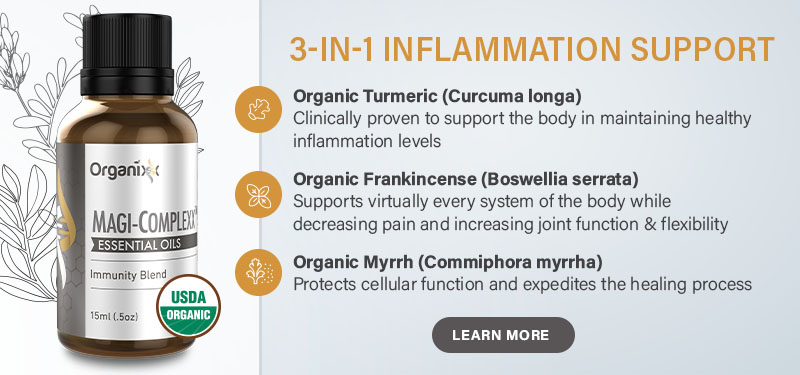
 Sources:
Sources:
Article Summary
Anxiety affects 18.1% of the U.S. population.
Essential oils have been used to alleviate anxiety for centuries.
Lavender is the best essential oil for anxiety across the board.
Research shows the positive effect orange essential oil has on the anxiety levels of patients.
Rose essential oil can act as an antidepressant.
Studies have shown geranium oil to help relieve anxiety and bring higher levels of well-being.
Peppermint, eucalyptus, and frankincense oils also have anti-anxiety benefits.

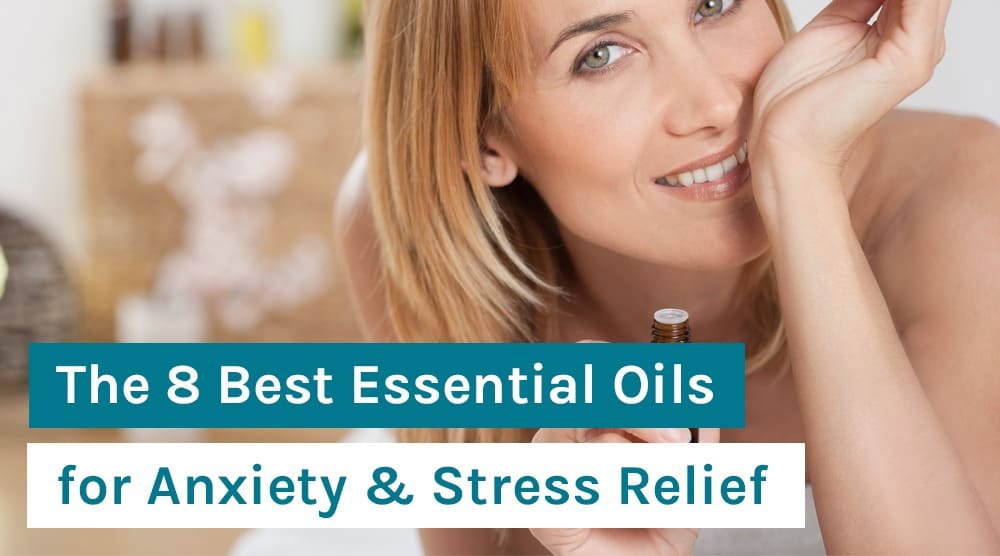
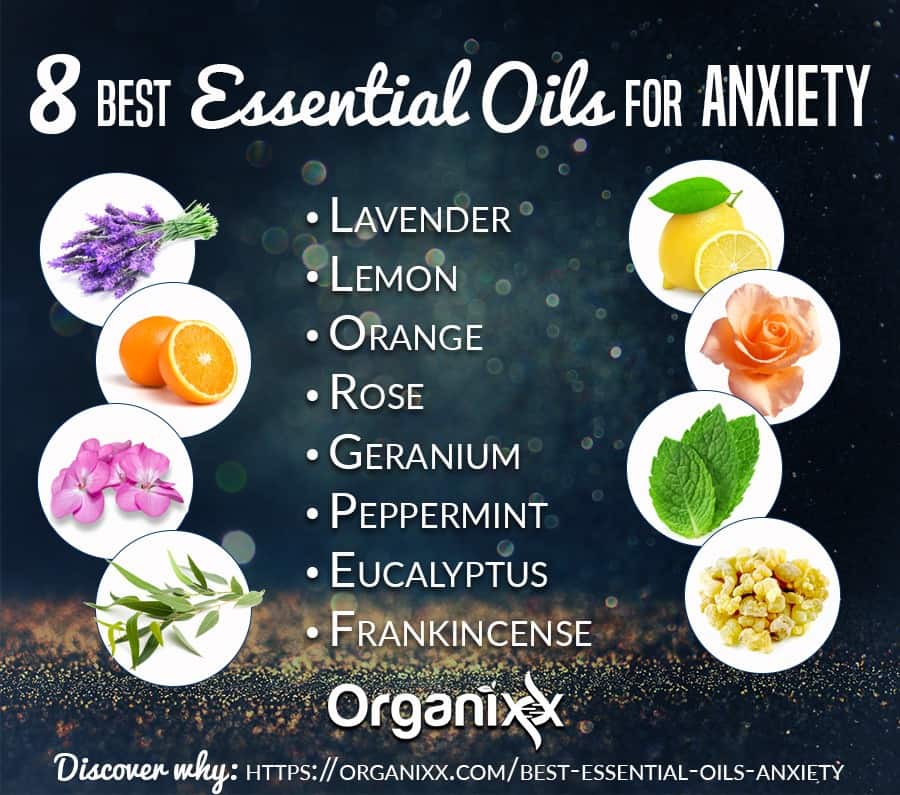
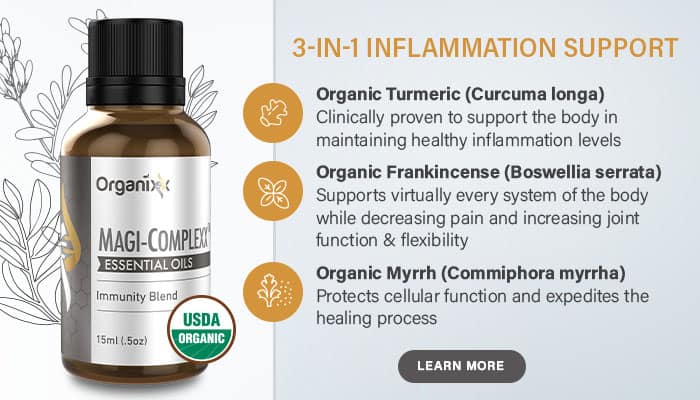
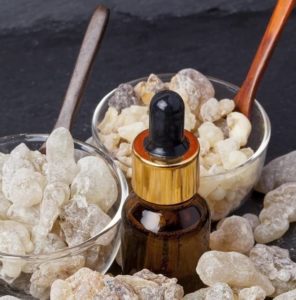

I like to use essential oils, You have tottery out witch You can stand, I used frankincense and
raised mine blood presser very high , it took me few days to normalize ...
You learn as You try, and there are books and in the websites , summits ..You learn
Thank you for providing all these wonderful facts on each of these essential
oils and all their health benefits. I honestly
didn’t realize how much each and every one of them has to offer. Right now I
have been using peppermint essential oils
and it has been an excellent oil with so many wonderful ways to benefit from it.
It has been my go to oil. However; after
learning about some of the others in this
article I feel there is so much more that
some of these others could do as well.
Thank you. Be well.
To relieve stress and anxiety, I myself use a mix of cedarwood or juniper and lavender in a cool diffuser.
I also rub lavender organic behind my ears to promote sleep. There was a time when I started to experience slight dizziness after using lavender organic continuously for about a month. Knowing that lavender lowers blood pressure, I checked my bp and sure enough, my bp was getting too low causing the dizzy spells. So I stopped apply it for a while and only use it occasionally now.
This is very informative! I've read a lot about essential oils and their health benefits. They've been used for a range of purposes, from medicinal to cooking purposes. I would recommend mixing a salt bath with essential oils like lavender for aromatherapy benefits.
We're glad you feel that way, Aika! Thank you for taking the time to check out this article. We appreciate your feedback, especially your helpful tip on using salt bath combined with essential oils.
What is the best essential oil for severe body skin itching ?